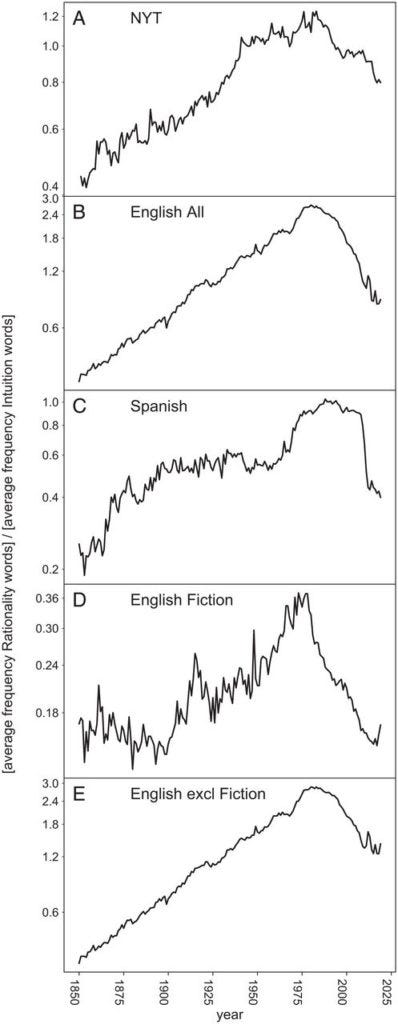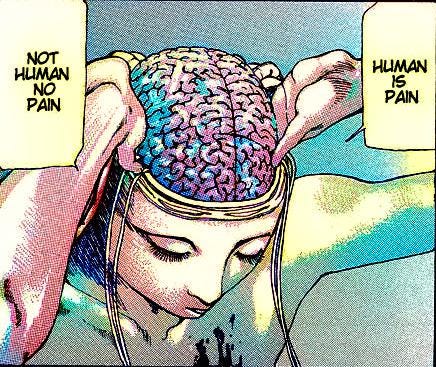The Long Game 86: Mental Wealth, Not Having Time, the Decline of Rationality
🌐 Web3 and China, Morning Routine, Orcas, Air Purifiers, 2021 Letter, Shein and Much More!
Hi there, it’s Mehdi Yacoubi, co-founder at Vital, and this is The Long Game Newsletter. To receive it in your inbox each week, subscribe here:
In this episode, we explore:
Mental wealth
Why you never have time
The decline of thinking over feeling
Knowing what you are building
Web3 and China
Let’s dive in!
🥑 Health
💰 Mental Wealth
I have the habit of revisiting this piece from James Beshara quite often. It calls for a preventive approach for mental health, and I think it’s a great message worth advocating for.
TL;DR
• When it comes to mental health, our society approaches it like we did with physical health 50 years ago. We only think about it when something goes wrong.
• To the wider public, mental health is synonymous with mental illness. Our notion of physical health is, however, very different than our notion of physical illness.
• We might benefit from approaching mental health like we invest in anything else in our lives (finances, relationships, careers, physical health, etc), where one builds wealth in this area by continuous, conscious investment.
• Estimates say that 83% of us will be hit with a mental health crisis in our lives, we can all make the choices to invest wisely in this area to improve our ‘mental durability’ to deal with it properly.
• In my 19 years of paying close attention to mental health, my experience has taught me that there are five foundations towards a concept I will call ‘mental wealth’ — sleep, diet, exercise, stress management, and exogenous compounds (anything from coffee to alcohol to prescription medication).
• There are simple tips one can adopt for these five areas to invest in one’s mental wealth.
For more: Justin Kan outlined some ideas in terms of practical things one can do to feel great. On top of that, Scott Alexander recommended the book Feeling Great that I haven’t read yet but only heard good things about.
🌱 Wellness
⏰ Why You Never Have Time
I re-read this article recently and found it even more powerful than the first time I read it. Why do we never feel we have enough time even if technology keeps improving and “saving us” time?
Better technology means higher expectations—and higher expectations create more work.
For most of history, humans blithely languished in their own filth. Most families’ clothes were washed on a semi-annual basis, and body odor was inescapable. The fleet of housework technologies that sprang into the world between the late-19th and mid-20th century created new norms of cleanliness—for our floors, our clothes, ourselves.
New norms meant more work. Automatic washers and dryers raised our expectations for clean clothes and encouraged people to go out and buy new shirts and pants; housewives therefore had more loads of laundry to wash, dry, and fold. As one 1920s housewife wrote, of her new dusting and mopping and furniture-polish technology, “because we housewives of today have the tools to reach it, we dig every day after dust that grandmother left to a spring cataclysm.”
The only way to find more time is to remove the unnecessary. Fewer commitments, fewer projects, lower expectations on what doesn’t matter so you can focus better on what truly matters.
🧠 Better Thinking
📉 The Rise and Decline of Thinking over Feeling
Here are some thought-provoking graphs showing the average frequency of Rationality words divided by the average frequency of intuition words.
Here’s the full paper:
The post-truth era has taken many by surprise. Here, we use massive language analysis to demonstrate that the rise of fact-free argumentation may perhaps be understood as part of a deeper change. After the year 1850, the use of sentiment-laden words in Google Books declined systematically, while the use of words associated with fact-based argumentation rose steadily. This pattern reversed in the 1980s, and this change accelerated around 2007, when across languages, the frequency of fact-related words dropped while emotion-laden language surged, a trend paralleled by a shift from collectivistic to individualistic language.
I don’t know where this is headed, but I don’t think it’s a great trend… The current media environment seems to be a good testimony of this.
⚡️ Startup Stuff
🛣 Know What You’re Building
When building a product, there’s the eternal tension between listening to feedback and potentially changing some aspects of the product/vision and doubling down on your initial product idea.
It can be tricky to navigate because the product you initially envisioned might take 12—18 months to build, or even more, so in the meantime, you’ll get feedback on a product that’s not exactly what you’re trying to build.
On top of that, it’s easy to get lost in the way between cycles of hype around some technologies, some additional requests from users, and more.
I liked this visualization about what your business is about (and what it’s not about) by @Thomasbcn.
📚 What I Read
🇨🇳 Web3 & China
Qiao Wang on Web3 & China. I’m all for Web3 and crypto, but I find it concerning to leave China completely dominating the world of atoms.
✉️ Dan Wang’s 2021 Letter
If there’s one thing to read this week, it’s Dan Wang’s 2021 letter.
Beijing’s goal is to channel entrepreneurial spirit towards useful goals. Profit cannot be the final standard of value, and the country’s best and brightest must work towards national salvation. I see that dynamic playing out in the regulatory campaigns this year.
The most important Politburo meeting of the year took place in April. The readout afterwards noted that the leadership identified a “window of opportunity” while growth was good to “concentrate on deepening structural reforms.”
It had previously signalled its unhappiness with the property and consumer internet sectors, and the leadership announced with this readout that there would be no better time to escalate its crackdowns. The central government subsequently launched campaigns to clean house. The tightening on every front has led the economist Barry Naughton to refer to the regulatory squeeze as a “summer storm” fit for the history books.I agree, and will make some remarks on the leadership’s goals as I see them.
👕 How Shein Beat Amazon at its Own Game
Whenever you think a company is so powerful that it can’t be defeated, think again. Here’s the example of Shein and fast fashion.
Amazon’s activity in China may have inadvertently contributed to Shein’s success. Starting around 2013, the e-commerce giant began aggressively recruiting manufacturers in the country to sell cheap products abroad on its third-party marketplace. As Chinese sellers joined the platform, Western consumers were flooded with thousands of new brands selling basic goods from kitchen supplies to electronics chargers under unfamiliar names like Nertpow, FRETREE, and BSTOEM.
Amazon gave these factories the enormous opportunity to cut out Western middlemen and begin learning about the tastes of American shoppers. In turn, Amazon was able to undercut the prices of its competitors, and by 2020, 40% of its third-party sellers were based in China.
Some more ideas to go after the big tech companies: for Google 👇
Finally, for Apple (no details, but just to underline the fact that things change way more than what we usually expect.)
🎙 Podcast Episodes of the Week
This week in podcasts:
David Sinclair: The Biology of Slowing & Reversing Aging
I particularly liked David’s insistence on measuring your biomarkers frequently to test how your lifestyle impacts your health overall.
Many doctors claim that you shouldn’t track things unless you have a real problem, and I understand where they’re coming from. But this is an even greater motivation for us to create products that are helpful and easy to use for people who wish to get the best health they can and not only be “ok.”
David’s longevity daily routine: Metformin (not when he trains), NMN, and Resveratrol. He takes them in the morning. He also fasts 22—2 and confirmed that strength training is essential.
Another essential idea is the vitality vs. longevity tradeoff: substances like testosterone and growth hormones might make you feel better as you age, but unfortunately, it’s at the expense of longevity.
Iñigo San Millán, Ph.D.: Mitochondria, exercise, and metabolic health
Everything you wanted to know about zone 2 training.
🍭 Brain Food
⚠️ The Replication Crisis
There are a lot of ideas and findings from psychology research we now take for granted that are actually not true. This is not happening only in psychology, but it’s more visible in this field than in any other.
Here’s a list of all the findings you might be familiar with that aren’t proven:
No good evidence of anything from the Stanford prison ‘experiment.’ It was not an experiment; ‘demand characteristics’ and scripting of the abuse; constant experimenter intervention; faked reactions from participants; as Zimbardo concedes, they began with a complete “absence of specific hypotheses.”
No good evidence from the famous Milgram experiments that 65% of people will inflict pain if ordered to. Experiment was riddled with researcher degrees of freedom, going off-script, implausible agreement between very different treatments, and “only half of the people who undertook the experiment fully believed it was real and of those, 66% disobeyed the experimenter.”
Lots of screen-time is not strongly associated with low wellbeing; it explains about as much of teen sadness as eating potatoes, 0.35%.
Reason to be cautious about mindfulness for mental health. Most studies are low quality and use inconsistent designs, there’s higher heterogeneity than other mental health treatments, and there’s strong reason to suspect reporting bias. None of the 36 meta-analyses before 2016 mentioned publication bias. The hammer may fall.
Related to the last bullet point:
🎥 What I’m Watching
🌇 A Typical Blueprint Morning
I love Bryan’s approach to optimizing his health. It might sound extreme in 2022, but I have no doubt that Bryan is 10—20 years ahead of his time. Expect way more of us to take a similar approach in the near future.
🐬 The Insane Biology of The Orca
I had no idea Orcas were the Apex predator of the oceans.
🔧 The Tool of the Week
🌬 Air Purifier
I’ve talked about air quality in the newsletter a couple of times. In Barcelona where I live, the air quality is poor so I’ve been looking for an air purifier. Here is a list of some of the best air purifiers on the market.
🪐 Quote I’m Pondering
This is something that's important to get done, and we should just keep doing it or die trying. Quitting is not in my nature.
— Elon Musk
If you enjoyed this newsletter, make sure to subscribe if you haven’t 👇
👋 EndNote
Thanks for reading!
If you like The Long Game, please share it on social media or forward this email to someone who might enjoy it. Podcast reviews are also gratefully received. You can also “like” this newsletter by clicking the heart just below this, which helps me get visibility on Substack.
Feel free to email me or find me on Twitter if you have any feedback or questions.
Until next week,
Mehdi Yacoubi
PS: Lots of newsletters get stuck in Gmail’s Promotions tab. If you find it in there, please help train the algorithm by dragging it to Primary. It makes a big difference.







